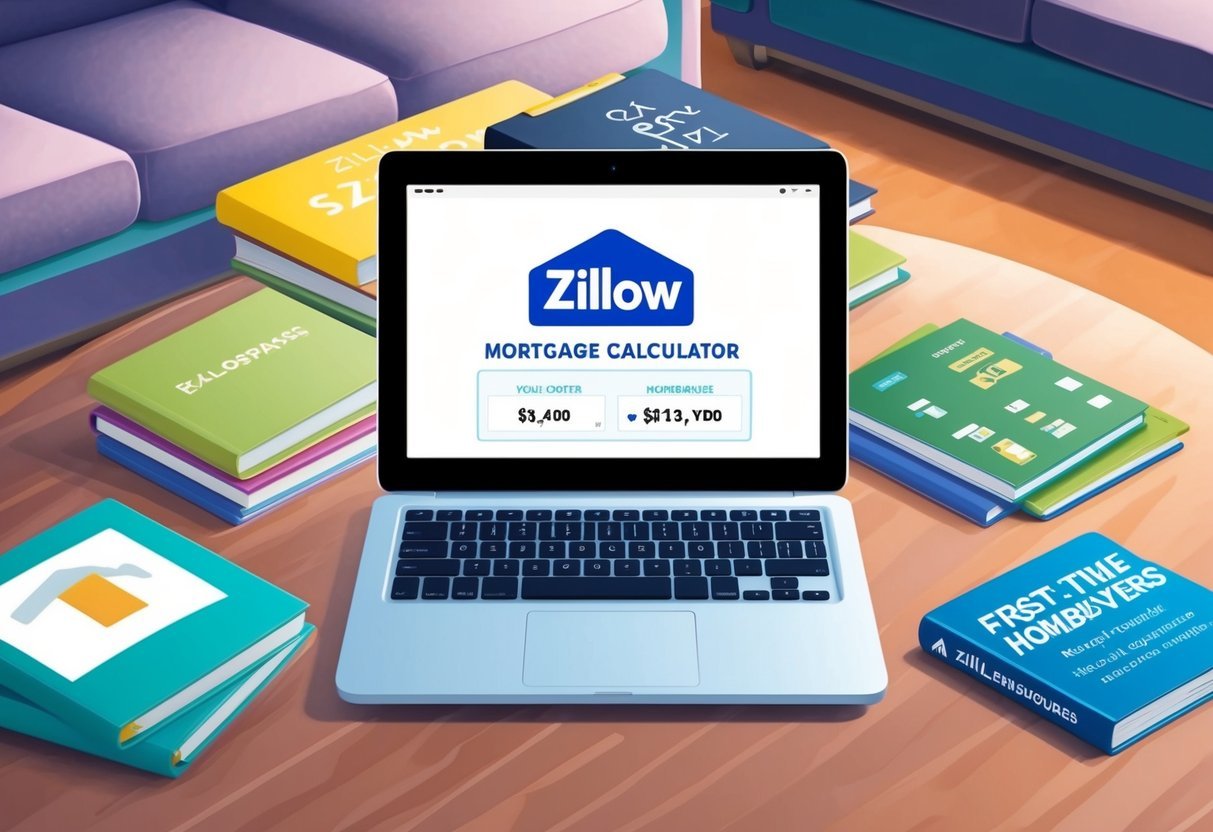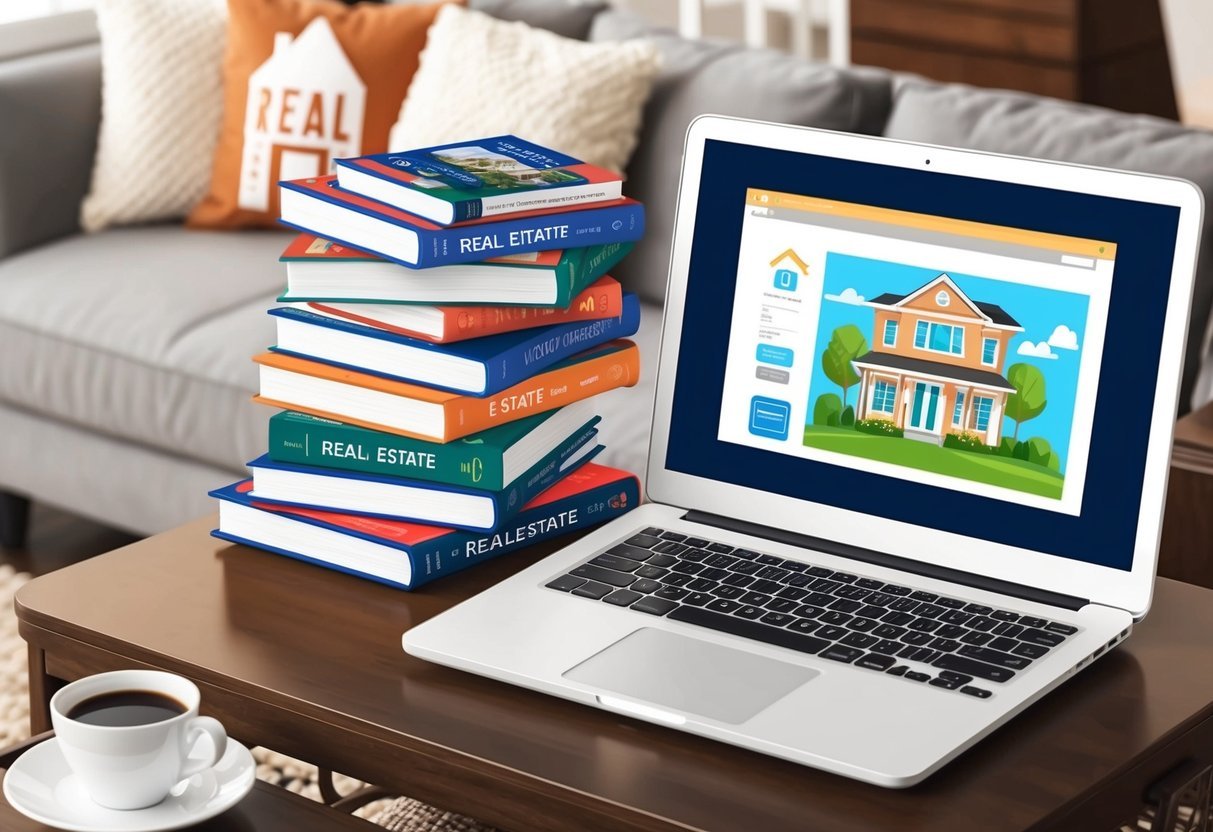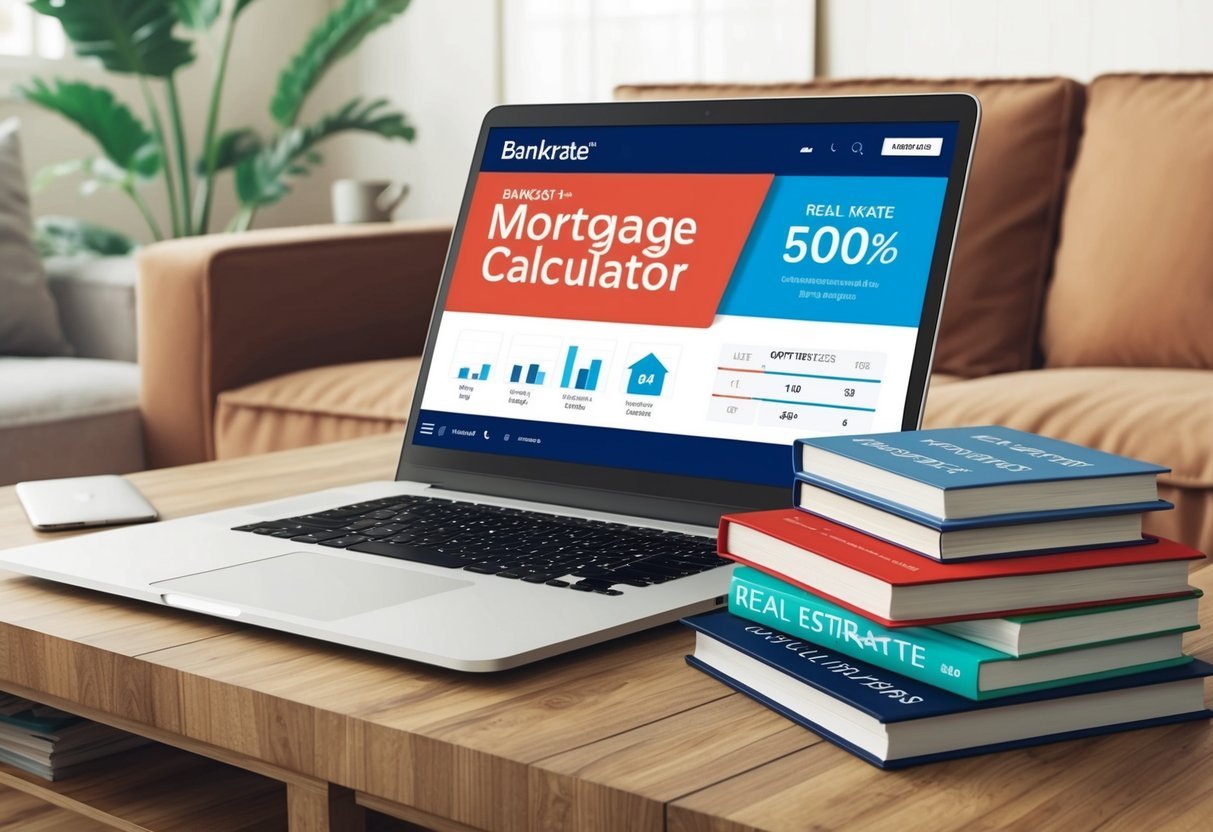Buying your first home can be an exciting yet daunting experience.
Navigating the real estate market requires knowledge, preparation, and access to the right resources.
As you embark on this journey, it’s crucial to arm yourself with reliable information and tools to make informed decisions.

Understanding the available real estate resources can significantly enhance your homebuying experience and help you secure the best deal possible. From online property listings to mortgage calculators, these tools are designed to simplify the process and provide valuable insights.
By utilizing these resources effectively, you’ll be better equipped to find your dream home and negotiate with confidence.
1) Zillow
Zillow is a valuable resource for first-time homebuyers seeking to navigate the real estate market.
This popular online platform offers a wealth of information to help you make informed decisions.
You can use Zillow to search for homes in your target area and filter results based on your budget and must-have features.
The site provides detailed property listings, including photos, price history, and estimated monthly payments.
Zillow’s learning center offers articles and guides on various aspects of homebuying.
You can find tips on avoiding common mistakes and understanding the purchasing process.
The platform also provides tools to explore first-time buyer programs, including grants and loans that may be available to you.
These resources can help you understand your financing options.
Zillow’s mobile app allows you to save favorite listings and receive notifications about price changes or new properties that match your criteria.
This feature keeps you up-to-date on market developments.
You can also find information on preparing to buy a house through Zillow’s educational content.
This includes advice on budgeting, saving for a down payment, and improving your credit score.
2) Realtor.com
Realtor.com offers a wealth of resources for first-time homebuyers.
You’ll find comprehensive listings of available properties across the United States, making it easy to browse homes in your desired area.
The site provides detailed information about each listing, including photos, price history, and neighborhood details.
You can use their advanced search filters to narrow down options based on your specific criteria.
Realtor.com also offers a 12-step home buying guide tailored for first-time buyers.
This resource walks you through the entire process, from assessing your readiness to buy to closing on your new home.
You’ll find helpful calculators on the site to estimate mortgage payments and determine how much house you can afford.
These tools can assist you in making informed financial decisions.
The website features articles and advice on various aspects of home buying.
You can learn about mortgage options, home inspections, and negotiating strategies.
Realtor.com’s mobile app allows you to search for homes on the go.
You can save favorite listings, receive notifications about price changes, and easily share properties with others.
3) Redfin

Redfin is a valuable resource for first-time homebuyers.
This online real estate brokerage offers a user-friendly platform with extensive property listings and helpful tools.
You can access detailed information on homes for sale, including high-quality photos, virtual tours, and property history.
Redfin’s website and mobile app make it easy to search for properties based on your specific criteria.
One of Redfin’s standout features is its home buying checklist.
This comprehensive guide walks you through each step of the purchasing process, helping you stay organized and informed.
The company also provides a team of local real estate agents who can assist you with property viewings and negotiations.
These agents often have in-depth knowledge of the areas they serve.
Redfin’s cost estimator tool can help you determine how much house you can afford.
This feature takes into account factors such as your income, debt, and down payment to provide a realistic budget.
You’ll find numerous articles and guides on Redfin’s website covering various aspects of home buying.
These resources can help you understand the process and make informed decisions.
Consider using Redfin’s notification system to stay updated on new listings that match your criteria.
This feature can give you a competitive edge in fast-moving markets.
4) Trulia

Trulia is a valuable online platform for first-time homebuyers.
You can access comprehensive property listings, neighborhood insights, and market trends all in one place.
The website offers detailed information on homes for sale, including photos, pricing history, and property features.
You can easily filter search results based on your preferences and budget.
Trulia’s blog provides a wealth of resources for first-time buyers.
You’ll find checklists, guides, and tips to help navigate the home-buying process.
One of Trulia’s standout features is its neighborhood data.
You can explore crime rates, school ratings, and local amenities before deciding on a location.
The platform also offers advice from experienced homeowners.
These real-world tips can provide valuable insights as you embark on your home-buying journey.
Trulia’s mobile app allows you to search for homes on the go.
You can set up alerts for new listings that match your criteria, ensuring you don’t miss out on potential properties.
5) Mortgage Calculator by Zillow

Zillow’s Mortgage Calculator is an invaluable tool for first-time homebuyers.
It helps you estimate your monthly mortgage payments quickly and easily.
By inputting the home price, down payment, and loan terms, you can get a comprehensive breakdown of your potential costs.
This includes principal and interest payments, property taxes, and insurance estimates.
The calculator also factors in private mortgage insurance (PMI) if your down payment is less than 20%.
This feature gives you a more accurate picture of your total monthly expenses.
You can adjust various parameters to see how they affect your payments.
Try different down payment amounts or loan terms to find the best fit for your budget.
The tool provides an amortization schedule, showing how your loan balance decreases over time.
This helps you understand the long-term financial implications of your mortgage.
Zillow’s calculator also estimates additional costs like homeowners association (HOA) fees.
These details help you avoid common first-time homebuyer mistakes by considering all potential expenses.
Use this resource to explore different scenarios and determine how much house you can afford.
It’s a crucial step in your home-buying journey, ensuring you make informed financial decisions.
6) NerdWallet Home Affordability Calculator

When you’re ready to crunch the numbers, NerdWallet’s Home Affordability Calculator is an invaluable tool.
This user-friendly calculator helps you determine how much house you can realistically afford.
To use the calculator, input your annual income, monthly debts, and desired down payment.
The tool then estimates the maximum home price you can afford based on these factors.
The calculator takes into account your debt-to-income ratio, ensuring you don’t overextend yourself financially.
It provides three affordability scenarios: conservative, moderate, and aggressive.
You’ll see an estimate of your monthly mortgage payment, including principal, interest, taxes, and insurance.
This gives you a clear picture of your potential housing costs.
The tool also allows you to adjust variables like interest rates and loan terms.
This flexibility helps you explore different scenarios and find the best fit for your financial situation.
Remember, just because you can afford a certain price doesn’t mean you should stretch your budget to the limit.
Use this calculator as a guide, but also consider your long-term financial goals and comfort level with debt.
By utilizing NerdWallet’s Home Affordability Calculator, you’ll gain valuable insights into your home buying power.
This knowledge will help you make informed decisions as you navigate the real estate market.
7) HomeLight

HomeLight offers valuable tools and services for first-time homebuyers navigating the real estate market.
This platform can help you connect with top-rated real estate agents in your area, streamlining the process of finding experienced professionals.
When you’re ready to start house hunting, HomeLight’s resources can guide you through important considerations.
They recommend staying under budget when searching for homes, giving you flexibility if you need to make a higher offer.
The platform provides insights into current market trends affecting first-time buyers.
With inventory scarcity and rising home prices, HomeLight can help you understand the challenges and opportunities in today’s real estate landscape.
If you’re considering both buying and selling, HomeLight offers innovative solutions.
Their Buy Before You Sell program can simplify the often complex process of coordinating a home purchase with a sale.
HomeLight’s website features educational content to support your homebuying journey.
You’ll find articles covering various aspects of the process, from financial preparation to closing on your new home.
8) The Balance Guide for First-Time Homebuyers

The Balance offers a comprehensive guide for first-time homebuyers, providing valuable insights into the home purchasing process.
This resource covers essential topics you need to understand before taking the plunge into homeownership.
One crucial aspect highlighted is budgeting for various home expenses, including your mortgage, utilities, and property taxes.
Understanding these costs upfront helps you prepare financially for your new home.
The guide emphasizes the importance of obtaining a preapproval letter from a local lender before house hunting.
This step demonstrates your seriousness to sellers and gives you a clear picture of your budget.
You’ll find information on major costs to plan for when buying your first home, such as the down payment, monthly mortgage payments, and various one-time fees.
These include closing costs, mortgage application fees, and home inspection expenses.
The Balance also advises consulting with real estate professionals to fully understand all costs involved in your purchase.
This guidance helps you avoid surprises and make informed decisions throughout the homebuying process.
By utilizing this resource, you’ll gain a solid foundation of knowledge to navigate the complexities of purchasing your first home with confidence.
9) Bankrate Mortgage Calculator

When you’re ready to crunch the numbers for your potential home purchase, the Bankrate Mortgage Calculator is an invaluable tool.
This user-friendly calculator helps you estimate your monthly mortgage payments with precision.
Simply input the home price, down payment amount, loan term, and interest rate.
The calculator will then provide you with a detailed breakdown of your potential monthly costs.
You’ll see not just the principal and interest payments, but also estimates for property taxes and insurance.
This comprehensive view gives you a realistic picture of your total housing expenses.
The calculator allows you to adjust variables easily.
You can experiment with different down payment amounts or loan terms to see how they affect your monthly payments.
By using this tool, you can better understand how much house you can afford.
It helps you avoid the common mistake of overextending your budget when buying your first home.
Remember, the results are estimates.
Actual costs may vary based on specific lender terms and local property tax rates.
Use this calculator as a starting point in your home buying journey.
Understanding Mortgage Options

Choosing the right mortgage is crucial for first-time homebuyers.
You’ll need to consider various factors like interest rates, loan terms, and your financial situation to make an informed decision.
Fixed-Rate vs Adjustable-Rate Mortgages
Fixed-rate mortgages offer stability with consistent monthly payments throughout the loan term.
Your interest rate remains unchanged, making budgeting easier.
This option is ideal if you plan to stay in your home long-term.
Adjustable-rate mortgages (ARMs) typically start with lower interest rates but can change over time.
They may offer lower initial payments, potentially allowing you to afford a more expensive home.
However, your payments could increase if interest rates rise.
Consider your risk tolerance and future plans when choosing between these options.
Fixed-rate mortgages provide predictability, while ARMs might save you money in the short term but carry more risk.
Qualifying for a Mortgage
To qualify for a mortgage, lenders typically evaluate your:
- Credit score
- Debt-to-income ratio
- Employment history
- Down payment amount
Improving your credit score can help you secure better interest rates.
Aim to pay down existing debts to lower your debt-to-income ratio.
A stable employment history demonstrates your ability to make consistent payments.
Your down payment affects your loan options.
While some programs offer low down payment options, a larger down payment can lead to better terms and lower monthly payments.
Consider getting preapproved for a mortgage before house hunting.
This process gives you a clear idea of your budget and strengthens your position as a buyer.
Navigating First-Time Homebuyer Programs
Various programs exist to assist first-time homebuyers in achieving their homeownership dreams.
These initiatives offer financial support, reduced down payments, and favorable loan terms to make purchasing a home more accessible.
Federal Assistance Programs
The Federal Housing Administration (FHA) provides loans tailored for first-time buyers, requiring only a 3.5% down payment.
These loans often have more lenient credit requirements compared to conventional mortgages.
VA loans, backed by the Department of Veterans Affairs, offer zero down payment options for eligible veterans and active-duty military personnel.
USDA loans cater to homebuyers in rural areas, providing 100% financing for qualified applicants.
The Good Neighbor Next Door program offers significant discounts to teachers, law enforcement officers, firefighters, and emergency medical technicians buying homes in revitalization areas.
State and Local Programs
Many states and municipalities offer specialized assistance programs for first-time homebuyers.
These can include:
- Down payment assistance grants
- Low-interest loans
- Tax credits
- Closing cost assistance
Check with your local housing authority or a real estate agent to discover programs specific to your area.
Eligibility often depends on factors such as income, credit score, and the property’s location.
Some programs may require you to complete a homebuyer education course.
These courses can provide valuable insights into the homebuying process and financial management.
Maximizing the Home Inspection Process
A thorough home inspection is crucial for first-time homebuyers.
It helps identify potential issues and ensures you’re making an informed decision.
Key Areas to Inspect
Pay close attention to the structural elements of the property.
Examine the foundation for cracks or signs of water damage.
Check the roof for missing shingles or signs of leaks.
Inspect windows and doors for proper sealing and functionality.
Don’t overlook the electrical system.
Ensure outlets are grounded and the circuit breaker is up to code.
Examine plumbing fixtures for leaks and proper water pressure.
Test the HVAC system for efficient heating and cooling.
Look for signs of pest infestations or mold growth.
Assess the insulation in attics and walls.
Check the condition of the flooring throughout the house.
Hiring a Qualified Inspector
Choose a certified home inspector with experience in your local area.
Ask for references and sample reports to gauge their thoroughness.
Ensure they’re licensed and insured.
Accompany the inspector during the examination.
This allows you to ask questions and gain insights into the property’s condition.
Take notes and photos for future reference.
Request a detailed written report with clear explanations and recommendations.
Review the report carefully and discuss any concerns with the inspector.
Consider specialized inspections for issues like radon or asbestos if needed.
Don’t hesitate to request additional inspections if you have specific concerns about certain aspects of the property.
Frequently Asked Questions
First-time homebuyers often encounter numerous questions during their journey.
Understanding key aspects of the process can help you make informed decisions and avoid common pitfalls.
What are the key factors to consider when choosing a location for a first-time home purchase?
When selecting a location, prioritize proximity to your workplace, local amenities, and future development plans.
Research crime rates, school districts, and property value trends in the area.
Consider the neighborhood’s walkability and access to public transportation.
How can first-time homebuyers understand and navigate the mortgage application process?
Start by getting preapproved for a mortgage to determine your budget.
Gather necessary documents, including proof of income, tax returns, and bank statements.
Compare offers from multiple lenders to find the best interest rates and terms.
What steps should first-time homebuyers take to prepare their finances before looking at properties?
Review your credit report and address any issues.
Save for a down payment and closing costs.
Pay down existing debts to improve your debt-to-income ratio.
Create a realistic budget that accounts for all homeownership expenses.
What are some common first-time homebuyer mistakes to avoid during the home buying process?
Avoid skipping the home inspection or rushing through it.
Don’t forget to factor in additional costs like property taxes, homeowners insurance, and maintenance.
Refrain from making large purchases or opening new credit lines before closing.
How important is a home inspection, and what should first-time homebuyers look for during one?
A home inspection is crucial for identifying potential issues with the property.
Pay attention to the condition of the roof, foundation, electrical systems, and plumbing.
Look for signs of water damage, mold, or pest infestations.
What types of home insurance policies should first-time homebuyers consider and why?
Consider a comprehensive homeowners insurance policy that covers the structure, personal property, and liability.
Evaluate additional coverage for natural disasters specific to your area, such as flood or earthquake insurance.
Don’t forget to insure valuable items separately if needed.

